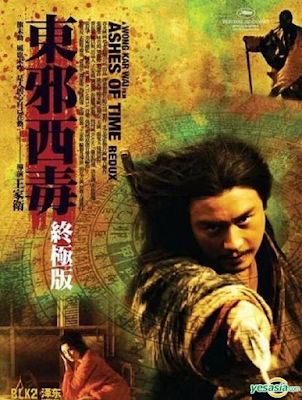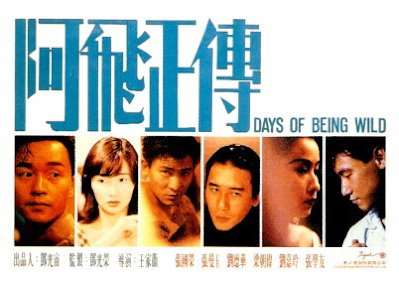The Grandmaster (2013) Chinese Title: 一代宗師 Translation: A Generation of Grandmasters
Starring: Tony Leung Chiu-Wai, Zhang Ziyi, Chang Chen, Zhao Benshan, Xiao Shenyang, Song Hye-kyo, Wang Qingxiang, Max Zhang Jin, Shang Tielong, Lo Hoi-Pang, Cung Le
Director: Wong Kar-Wai
Action Director: Yuen Woo-Ping
The Grandmaster came out at the height of Ip Man-ia in East Asia. Although Wong Fei-Hung was the “big thing” in Chinese folk heroes in the 50 and 60s, and then in the 90s, he was more or less replaced in the 00s with Ip Man…THE MAN WHO TRAINED BRUCE LEE!!!! I do find it cool how martial arts masters in China develop their own folklore that is miles removed from whatever might’ve happened in their real lives. Bruce Lee became the subject of that within a few years of his own death. Ip Man had to wait more than 30 years after his passing to reach that point. That means that in two or three decades, we’ll start getting movies about the martial awesomeness of Jimmy Wang Yu!
Anyway, where was I? Oh yeah, Ip Man-ia. It started in 2008 with the first Wilson Yip/Donnie Yen Ip Man film. Two years later, we got both a sequel and a pseudo-spin-off, A Legend is Born: Ip Man. That starts Dennis To—who looked A LOT like Donnie Yen—as a young Ip Man who has to fight Japanese terrorist babies and ninjas. By 2012, China had its own 50-episode Ip Man TV series being broadcast. The following year, we got Ip Man: The Final Fight and this movie. We eventually got two more “official” Ip Man films, a spin-off to those movies, and a whole bunch of low-budget Ip Man movies, including Ip Man: Kung Fu Master and Ip Man and the Four Kings.
Arthouse director Wong Kar-Wai apparently wanted to make a movie about Ip Man even before Donnie Yen started the trend. I’m guessing that his script went through all sorts of rewrites, plus he actually required his actors to train in the styles they were supposed to represent. Apparently, actor Chang Chen became proficient enough in bajiquan that he actually won a regional tournament. I guess actor Tony Leung broke his arm while training in wing chun, which is what ultimately held up production, although knowing Wong Kar-Wai, I wonder if he spent a good chunk of the film’s production time in editing.
The final product is a bit of an odd beast. It is about Ip Man, but in a lot of ways, it isn’t. In fact, the little life details that make Ip Man who he was are given so little attention that the film’s themes could have been explored with a completely fictitious protagonist and the result would have largely been the same.
The film opens in 1936 with Ip Man in his early 1940s. This is a year before the Second Sino-Japanese War (1937 – 1945) started and Ip Man is still living well thanks to his and his wife’s families’ old money. He tells us in narration that the first 40 years or so of his life were relatively easy compared to what came later. Ip Man lives in Foshan with his wife, Cheung Wing-Shing (South Korean actress Song Hye-kyo, of John Woo’s The Crossing and “Descendants of the Sun”), and four children. But that’s really not important.
What is important is that Master Gong Yutian (Wang Qingxian, Red Cliff and Song of the Assassins) is retiring. Master Gong is an important figure in the martial arts for a variety of reasons. He is the first master to “combine” the internal styles of both baguazhang and xingyiquan (of hsing-I chuan) and he has opened martial arts academies all over China, including in the south. Thus, he is seen as something of a unifying force in the world of Chinese martial arts. As he is retiring and returing to his home in the north, he decides to duel with a representative of Southern Chinese kung fu in a “goodwill duel.” The representative of Southern China is ultimately chosen to be Ip Man, apparently chosen on the basis of a duel he had with a gang (led by True Legend’s Cung Le) at the very beginning of the film.
While Ip Man is preparing for the duel, Master Gong’s top student, Ma San (Max Zhang, of Rise of the Legend and Undiscovered Tomb), tries to insert himself into the mix as a “mini-boss.” You know, “If y’all can’t beat me, don’t even try to fight my master.” Well, Master Gong is incensed with his students behavior and send him home. But that’s not important.
What is important is that the duel goes as planned, although it is carried out in an unconventional manner, with Ip Man being victorious (albeit in a humble way). Master Gong retires, but his daughter, Gong’er (Zhang Ziyi, of The Banquet and Rush Hour 2), doesn’t like the idea of dad losing. So, she challenges Ip Man to a duel and sorta wins, I guess. But the duel reveals something of a mutual attraction between the two.
Before Ip Man can travel to the north to see her and check out her 64 Palms—I’m sure most men would like to test out Zhang Ziyi’s 64 palms—war breaks out and all of that old money is lost, plunging the Ip family into poverty. Ip Man eventually has to go to Hong Kong in search of greener pastures, but that’s not important. What is important is that Ma San has become a puppet for the Japanese forces, which leads to his expulsion from the Bagua school by Master Gong. So, Ma San just kills him and takes over the school anyway. Gong’er is angry about this and decides to throw away a promising marriage and career in medicine—do not ask me to explain the cultural implications of having a career only if married—in order to seek revenge against Ma San. Will the paths of Gong’er and Ip Man ever cross again?
As I stated before, the odd thing about The Grandmaster is how all the events in Ip Man’s life that separate him from “generic kung fu movie protagonist” are given the short shrift in the script. We find out that he is permanently separated from his wife after moving to Hong Kong, although the film only mentions it a bit of narration. We never find out the historical and political implications that led to their separation. We find out that his two daughters die (of illness?) during the war, but the film spends no time with his children, so we have little reason to care. Like the other films, The Grandmaster completely glosses over his (apparently) notorious opium addiction. I guess unless your name is Iron Bridge Sam, whitewashing your kung fu folk hero’s drug issues is important in saving face.
So what is the film about in the end? The first act is a celebration of the final days of the old wulin, or martial world. There is a certain nostalgia of the old days when kung fu masters would converge in brothels and bordellos in order to have duels (witnessed by prostitutes and their clients). These scenes represent the film at its most beautiful, with wonderful cinematography and art direction, thanks to Oscar nominees Philippe le Sourd and William Chang. This is driven home in one of the film’s final scenes, where Zhang Ziyi’s Gong’er is walking down a Hong Kong street at night. Observing all the smaller buildings used as kung fu schools, she laments, “Is this all that’s left the martial world?”
The second two acts become something of a series of comparisons and contrasts between the directions that Ip Man’s and Gong’er’s lives take after their fateful duel. Ip Man is forced into poverty and goes to Hong Kong, where he humbly spends the rest of his days passing on Wing Chun to a new generation. Meanwhile, Gong’er has it all, but willingly throws it all way in order to save face (or family pride). She gets what she wants—revenge—but it comes at a price, both to her and the kung fu style she represents. Indeed, an entire lineage of baguazhang is lost by the end of the film due to her actions.
There are two climaxes to the film. The external climax is actually shown in flashback form and details the final showdown between Gong’er and Ma San. That starts at about the 80-minute mark and lasts for ten minutes. Much like Wong Kar-Wai’s Ashes of Time, the real climax is emotional, much like Maggie Cheung’s monologue in that movie. In this case, it is the final meeting between Ip Man and Gong’er and her evaluation of the life that she has led. The first time I watched this, I was disappointed at how unlike a traditional kung fu movie the story structure was. Watching it a second time, I was actually quite moved by both Gong’er and her final soliloquy, especially when it flashbacks to the character as a child. We see the enormous potential in her, which ended up never getting realized as the result of both cultural norms and personal decisions. As someone who often feels like his own potential by the directions his life has taken, it hits me in the feels to see that happen in a character in such a stark way.
If you can get around the film’s unconventional story structure, I would say that the main flaw of the film is Chang Chen’s character, The Razor. Introduced tangentially as an anti-Japanese agent, he follows a life path rather similar to Ip Man, finding a similar niche in the Hong Kong martial arts scene at the same time Ip Man’s reputation is taking off. The problem is that his character literally never crosses paths with Ip Man and doesn’t have a particularly meaningful moment with Gong’er when taking in the story as a whole. The entire film could have been shortened by the duration of his scenes and it would not have affected the final product. That said, his big fight scene is a banger.
Speaking of which, the fight scenes were staged by Yuen Woo-Ping and his team, which won Yuen a Hong Kong Film Award for Best Action Choreography, beating out Donnie’s Special I.D. and Andy Lau’s Firestorm, among others. Early trailers suggested that this would be about as wired up as Master Z: The Ip Man Legacy, but that really is not the case. The fight scenes are grounded for the most part, save people getting knocked back ten or fifteen feet on occasion. There is a lot of slow motion in the choreography, which gives the fight sequences very much an artistic, “beautiful” feel. We get to see a lot of styles on display: wing chun (Tony Leung), bagua (Zhang Ziyi), hsing-I (Max Zhang), and even some hung gar courtesy of old school actor Lau Kar-Yung (Dragon’s Claws and The 36 Crazy Fists). The choreography is great and photography and editing are just gorgeous. The most intense fight is the aforementioned one between Razor and his colleagues, where he gives a lesson in bajiquan, which uses a lot of elbow strikes. The big fight between Gong’er and Ma San is a highlight, as the two go at with two of the major Chinese internal styles on a train platform in slow motion as the train is leaving the station. The entire sequence is just shot to perfection.
I think The Grandmaster is the sort of film you need to watch more than once. The first time may be off-putting in the way the plot progresses, especially if your expectations are based on Donnie’s Ip Man films. But once you get past the shock of its unconventional storytelling, there is some important martial wisdom and poignant character moments to experience, even if they don’t involve the characters you would expect in a Ip Man biopic.













